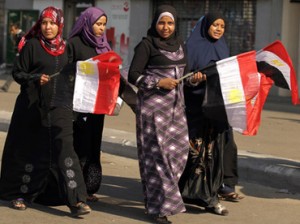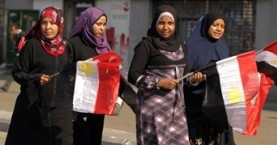
Egypt was ranked 126 out of 135 countries in a report that measured gender inequality. The report was released by the World Economic Forum and casts a light on Egypt as the country attempts to deal with gender issues in the field of economics, education and politics.
The first category of measurement was economic participation and opportunity. Mouna Mounir Rizk, the secretary-general for the Women’s Committee within the Free Egyptians Party, said in the current economic downturn, it is women who are suffering the most, “especially those women in the lower class. We have 41 per cent of women here in Egypt who are in charge of their families; they are the ones carrying their families. They are finding it increasingly difficult since the revolution to support their families and the places they are being forced to live are horrible.”
Doctor Nagla Al-Adly, the general manager of the statistics and research department at the National Council for Women, said her organisation seeks to address this problem through their social development fund that gives women money to establish their own business. She claimed the fund reached 30 per cent of Egyptian women last year.
One of the top priorities for these female heads of household according to Rizk is education, which is another metric used by the World Economic Forum. Al-Adly said women in Egypt start off at a massive disadvantage with many girls not sent to school. “It’s related to various factors in Egyptian culture, among them is the preference of families to send their boys to school. They want the girls to stay at home, especially young girls, to stay at home and help their mothers.”
Despite this obstacle when young, women in Egypt end up passing their male counterparts by the time they get to post-graduate education. Al-Adly said according to NCW numbers, 65 per cent of master’s and doctoral students in Egypt are women.
The World Economic Forum included a measurement for political empowerment. Rizk, heavily involved in politics herself, directed her comments at the current Constituent Assembly and the draft constitution they recently produced. “We are against the current make up of the Constituent Assembly that has no liberal women as members.” Rizk said the women who are involved are all from Islamist groups and other liberals are few and far between.
“Liberal women are committed to changing the situation, to break these barriers,” said Rizk. “We are trying to make more pressure on the ground to have people demand their right and let people know that there will be no rights for women as long as these people are in power.”
Nordic countries; Iceland, Finland, Norway and Sweden topped the list. However, fellow African states Lesotho, South Africa, Mozambique and Burundi all made it into the top 25.
Egypt’s ranking at 126 put the country one place behind Oman and one ahead of Iran. Yemen rounded out the rankings at 135.


